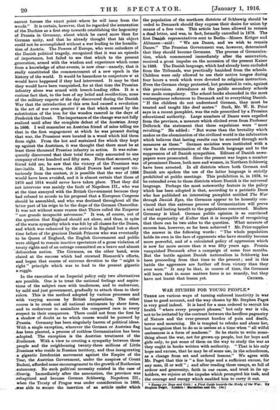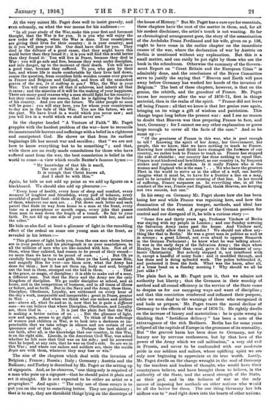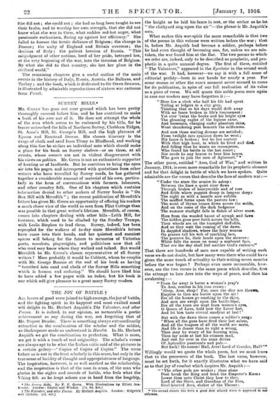WAR STUDIES FOR YOUNG PEOPLE.•
THERE are various ways of turning enforced inactivity in war time to good account, and the way chosen by Mr. Stephen Paget is very good indeed. It is hard for a man ordered to recruit his health " where every prospect pleases," but only war is vile, not to be irritated by the contrast between the heedless pageantry of Nature and the ever-present burden of pain and death, terror and mourning. He is tempted to rebuke and abuse her, but recognizes that to do so is useless at a time when " all wilful uselessness is a form of madness." So he starts to write some- thing about the war, not for grown-up people, but for boys and girls only, to put some of them on the way to study the war as they ought in books written with authority. " That is his only hope and excuse, that he may be of some use, in the schoolroom, as a change from set and ordered lessons." We agree with Mr. Paget that this is " a fine hope and a sufficient excuse, for any man, ill or well " ; and after reading these essays, so full of ardour and generosity, faith in our cause, and trust in its up- holders, we rejoice at the impulse which prompted his task, and the courage and energy which enabled him to carry it out.
• Essays for Boys and Girls : a First Guide towards the Study of the War. By Stephen Pay,et, London Macmillan sad Co. lie.]
At the very outset Mr. Paget does well to insist gravely, and even solemnly, on what the war means for his audience :— " In all your study of the War, make this your first and foremost thought, that the War is for you. It is you who will enjoy the new order of things, when the War is done. Your countrymen are giving their lives for their country : it is your country, and in it you will pass your life. Our dead have died for you. They died in the defence of a good cause, that they might leave this world better than they found it ; it is you will find this .world better than they found it. You will live in Peace, because they died in War : you will go safe and free, because they went under discipline, and into danger, up to the moment of their death. Yoh will have a good time, because they suffered. To you, who gain by their loss, and whose life is made comfortable by their lives laid down, comes the question, from countless little wooden crosses over graves in France and Belgium and Gallipoli, and from all the unmarked graves of the sea, Is it nothing to you ? Why, the War is your War: You will enter into all that it achieves, and inherit all that it earns ; and the miseries of it will be the making of your happiness. There are many good reasons why a man should fight for his country ; but they come to this one reason, that he is fighting for the future of his country. And you are the future. We older people so soon will be gone : you will stay here, you for whom your countrymen to-day are in the toils of this War. You are the future, we are the past. We have lived in a world which you never saw ; and you will live in a world which we shall never see."
In the chapter headed " A Venture of Faith " Mr. Paget grapples with the hardest problem of the war—how to reconcile its immeasurable horrors and sufferings with a belief in a righteous and omnipotent God. He shows us that from its earliest beginnings life has meant war and sacrifice ; that " we are not here to know everything but to be something " ; and that, while there are no ready-made consolations for those who have suffered most from the war, the best consolation is belief in the world to come—a view which recalls Baxter's famous hymn :- " 3Iy kaowledge of that life is small, The eye of faith is dim ; It is enough that Christ knows all, And I shall be with Him."
Again, he bids us not add up pains as we add up figures on a blackboard. We should also add up pleasures :-
"Every hour of health, every hour of sleep and comfort, every moment of laughter and friendship, every puff of tobacco, every mouthful of good food—add them all up, quick, all the daily millions of them, wherever our men are. . . Put down each letter and each parcel that finds its way from home to a man at the front, every tune on a gramophone or mouth organ, every joke that passes from man to man down the length of a trench. Be fair to your faith. Do not fill up one side of your account with her, and not the other."
He bids us also find at least a glimmer of light in the ennobling effect of the ordeal on some one young man at the front, as revealed in his letters :-
"This glimmer of light leads you, from the one man whose letters are in•your pocket, and his photograph is on your mantelpiece, to all the millions of men who are like-minded with him. Not all of them, when they enlisted, had reason to be proud of their record— no more than we have to be proud of ours. . . . But Oh ye carefully brought-up boys and girls, bless ye the Lord, praise Him, and magnify Him for ever—see them now, what the Army has done for them ; how it has set them up, body and soul, brought out the best in them, stamped out the bad in them. . . . That is the grace, or magic, of discipline : it is able to make out of a man, a different man. Not that the Navy and the Army are the only Kingdom of discipline. We go under discipline at school, and at home, and in the competition of business, and in all times of illness or failure, and so forth. But in the Navy and the Army, these three, Discipline, Obedience, Loyalty, are enthroned on every hour of the day's work, inseparable and insuperable ; great in Peace, greater in War. . . . And when we think what our sailors and soldiers are—above all, what So-and-so is, now that he is quite a different man—we can believe that where Discipline, Obedience, and Loyalty are, there God is. . . . It is just the plain fact that the War is making a better nation of us. . . . But the glimmer of light, now and again, seems to go right out. To think of the sufferings of women and children in War, is to look into a darkness so im- penetrable. that we take refuge in silence and are certain of our ignorance and of that only. . . . Perhaps the best shield of our faith, after all, is the knowledge that our country, in this War, is on the right side,, Lincoln, in the American Civil War, was asked whether he felt sure that God was on his side ; and he, answered that he hoped, at any rate, that he was on God's side. So are we in this War ; and where our sailors and soldiers are, there the verilla Regis are with them, whatever they may lose or win."
The aim of the chapters which deal with the invasion of Belgium ; France ; Russia ; Italy ; Germany ; Austria and the Balkans ; and Turkey is described by Mr. Paget as the setting up of signposts. And, as he observes, " one thing only is required of a man who puts up a signpost—that he should paint it plain and set it-straight. He is not expected to be either an artist or a geographer." And again : " The only use of these essays is to -put you on the way to something better. They are preliminary ; that is to say, they are threihold'things1ying Oh the doorsteps of
the house of History." But Mr. Paget has a sure eye for essentials, these chapters have the root of the matter in them, and, for all
his modest disclaimer, the artist's touch is not wanting. So far as chronological arrangement goes, the story of the assassination of the Archduke Franz Ferdinand and his wife, given on p. 156, ought to have come in the earlier chapter on the immediate causes of the war, where the declaration of war by Austria on Serbia is mentioned without any explanation. But this is a small matter, and can easily be put right by those who use the book in the schoolroom. Otherwise the summary of the Govern-
ment Report on " Great Britain and the European Crisis " is admirably done, and- the conclusions of the Bryce Committee serve to justify the saying that " Heaven and Earth will pass away before Germany has washed her hands of the invasion of Belgium." The best of these chapters, however, is that on the genius, the rebirth, and the grandeur of France. Mr. Paget traces her recovery after the war of 1870-71, first in things material, then in the realm of the spirit. " France did not leave off being France : all that we know is that her genius rose again, bringing on its wings a gift of wisdom and patriotism. This change began long before the present war : and I see no reason to doubt that Heaven was thus preparing France to face, and beat, Germany ; for I cannot see any other explanation or guess large enough to cover all the facts of the case." And so he sums up :-
" Of the greatness of France in this war, who is poet enough to tell ? Knowing the spirit of her Army, her Government, her people, this we know, that we have nothing to teach to France. Knowing how strikes and drink have damaged the forionnes of our country, we rather look to France to teach us. France has stopped the sale of absinthe : our country has done nothing to equal that. France is not hindered and bewildered, as our country is, by frequent strikes and rumours of strikes. Is it really France who is the woman and England who is the man ? . . . We who have the greatest Fleet in the world to serve us in the office of a wall, can hardly imagine what it must be, to have for a frontier a line on a map, and to be invaded by the mere crossing of that line. In her record of suffering, France surpasses us. In everything else, in all the conduct of the war, France and England, thank Heaven, are keeping not two records, but one."
In his essay on Germany Mr. Paget shows how she has been losing her soul while France was regaining hers, and how the domination of the Prussian temper, methods, and ideal has contributed to that end. A propos of the German passion for control and our disregard of it, he tells a curious story :—
" Some five and thirty years ago, Professor Virchow of Berlin was staying with my people in London ; and one Sunday morning the Salvation Army came past the house. And Virchow said, Do you really allow that in London ? We should not allow any-. thing like that in Berlin.' He was a great man in politics as well as in science ; a great Liberal, not even afraid to oppose Bismarck in the German Parliament ; he knew what he was talking about. It was in the early days of the Salvation Army ; the days when Huxley, less far-sighted than usual, gave it the nickname of cory- bantic Christianity. But nobody stopped it, nor interfered with it, except a handful of noisy fools and it muddled through, and has done and is doing splendid work. The police befriended it, and protested it from the fools. What was the harm, after all, of a brass band on a Sunday morning ? Why should we all be just alike Y "
The plain fact is, as Mr. Paget puts it, that we admire not authority but liberty ; that the Germans in their worship of method and all-round efficiency in the service of the State came to despise us for our easygoing ways and want of discipline ; and that this conviction reinforced and inflamed their purpose, while we were deal to the warnings of those who recognized it and bade us prepare.' Mr. Paget traces the moral decline of Germany to the effects of the war of 1870-71. He rightly dwells on the increase of lUxury and materialism : he is quite wrong in thinking that " fastidious delicacy " has been a note of the extravagance of the rich Berliners. Berlin has for some years eclipsed all the 'capitals of Europe in the grossness of its sensuality.
But " the gravest harm has been done to Germany, not by luxury nor by nervous restlessness, but by that love of the
power of the Army which we call militarism," a very old evil in Prussia, and never to be confounded with our moderate pride in our soldiers and sailors, whose uplifting spirit we are only now beginning to appreciate at its true worth. Lastly,
Mr. Paget dwells on the change wrought in the soul of Germany by the teachers and leaders of thought, who would have their
countrymen believe, and have brought them to believe, in the authority of the State,'and the armed strength of the State, as their god, and in the 'holiness of war 'as the only means of 'imposing her methods on other nations who would be all the better for them. • The one thing• Germany has left undone was to " read right down into the hearts of other nations.
She did not ; she could not ; she had so long been taught to see their faults, and to worship her own strength, that she did not know what else was in them, what sudden red-hot anger, what passionate enthusiasm, flaring up against her efficiency." She failed to foresee the heroic defiance of Belgium; the ohange in France ; the unity of England and Britain overseas ; the decision of Italy ; the patient heroism of Russia. " This misjudgment of other nations, bred of her pride, betrayed her, at the very beginning of the war, into the invasion of Belgium. By what she did to that country, she lost her place in the civilized world."
The remaining chapters give a useful outline of the main events in the history of Italy, Russia, Austria, the Balkans, and Turkey ; and the book, which is dedicated to Sir Owen Seaman, is illustrated by admirable reproductions of sixteen war cartoons from Punch.












































 Previous page
Previous page